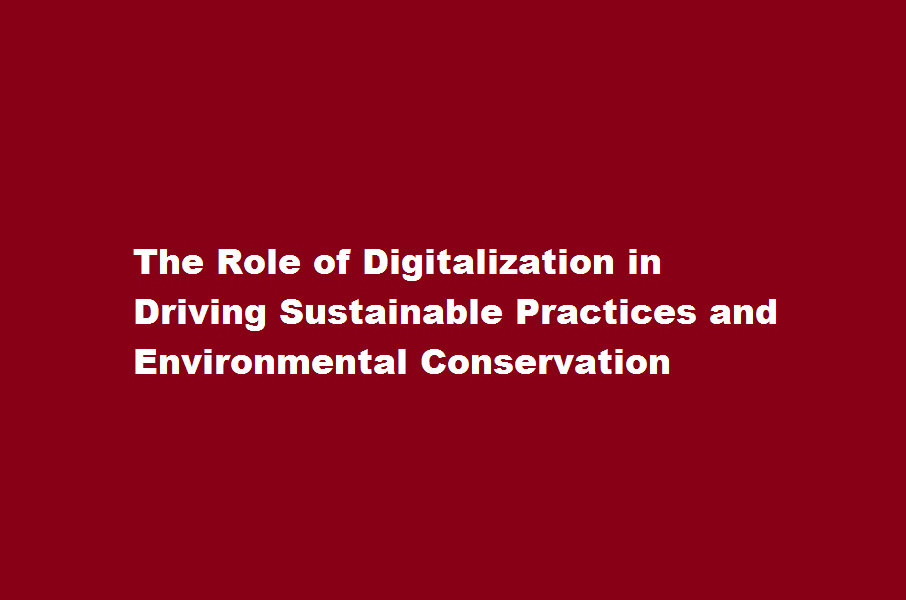The Role of Digitalization in Driving Sustainable Practices and Environmental Conservation
4 min read
Introduction
Digitalization has emerged as a powerful tool in driving sustainable practices and environmental conservation. As businesses and industries increasingly embrace digital technologies, the potential for reducing environmental impact and promoting sustainability becomes evident. This article delves into the ways in which digitalization contributes to sustainable practices, including reduced paper usage, energy optimization, remote work opportunities, and enhanced efficiency across various sectors.
Reduced Paper Consumption
Digitalization significantly reduces the reliance on paper, leading to significant environmental benefits. With the shift towards digital documents, processes such as online billing, electronic contracts, and digital signatures are becoming commonplace. This transition not only saves trees but also minimizes water consumption, energy usage, and the carbon footprint associated with paper production and disposal.
Energy Optimization
Digitalization plays a crucial role in optimizing energy consumption across industries. Smart technologies, including Internet of Things (IoT) devices, enable efficient energy management by monitoring and controlling energy usage in real-time. Smart grids help balance energy supply and demand, reducing wastage. Additionally, energy management systems optimize heating, ventilation, and lighting in buildings, resulting in reduced energy consumption and lower greenhouse gas emissions.
Remote Work Opportunities
Digitalization has transformed the way people work, allowing for increased remote work opportunities. By leveraging digital communication tools, cloud computing, and collaboration platforms, employees can work from home or any location, reducing the need for daily commuting. This shift not only reduces carbon emissions associated with transportation but also promotes work-life balance and reduces the strain on infrastructure.
Efficient Supply Chains
Digitalization optimizes supply chain operations, leading to reduced waste and improved efficiency. Advanced analytics and data-driven insights enable better demand forecasting, inventory management, and route optimization, minimizing unnecessary transportation and storage. Real-time tracking and monitoring systems provide visibility into supply chain processes, helping identify inefficiencies and areas for improvement, ultimately reducing environmental impact.
Virtualization and Dematerialization
Digitalization enables the virtualization and dematerialization of products and services. Streaming services, e-books, and digital media reduce the need for physical copies, resulting in less resource extraction, manufacturing, and waste generation. Virtual meetings and conferences replace the need for travel, reducing carbon emissions from air travel. Digital platforms also enable the sharing economy, promoting resource sharing and reducing overall consumption.
Data-Driven Sustainability
Digitalization empowers organizations to make data-driven decisions to improve sustainability performance. Advanced analytics and machine learning algorithms help analyze vast amounts of data to identify patterns, optimize processes, and drive sustainable practices. Real-time monitoring systems enable the identification of energy and resource inefficiencies, facilitating targeted interventions and promoting continuous improvement.
Frequently Asked Questions
How does digitalization contribute to reducing carbon emissions?
Digitalization contributes to reducing carbon emissions in several ways. It enables remote work and virtual meetings, reducing the need for commuting and air travel. Digital platforms streamline processes, minimizing energy-intensive paperwork and optimizing supply chains for more efficient transportation. Smart technologies and energy management systems enable better control and optimization of energy usage, further reducing carbon emissions.
Can digitalization help in waste reduction and recycling?
Yes, digitalization can help in waste reduction and recycling. By promoting virtualization and dematerialization, digitalization reduces the need for physical products and their associated waste generation. Additionally, digital platforms facilitate better waste management through data analytics, enabling organizations to identify opportunities for waste reduction, recycling, and circular economy practices.
How does digitalization contribute to sustainable urban development?
Digitalization plays a crucial role in sustainable urban development. Smart city initiatives leverage digital technologies to optimize energy usage, improve transportation systems, enhance waste management, and promote citizen engagement. Smart grids, intelligent traffic management systems, and sensor-based waste management enable more efficient resource allocation, reduced emissions, and improved quality of life in urban areas.
Conclusion
Digitalization has emerged as a powerful driver of sustainable practices and environmental conservation. Through reduced paper consumption, energy optimization, remote work opportunities, efficient supply chains, virtualization, and data-driven sustainability, digitalization transforms industries and promotes a greener future. Embracing digital technologies and harnessing their potential for sustainability will play a critical role in addressing environmental challenges and creating a more sustainable world for future generations.
Read Also : The Digitalization Revolution Transforming Retail and Enhancing Customer Shopping Experiences






